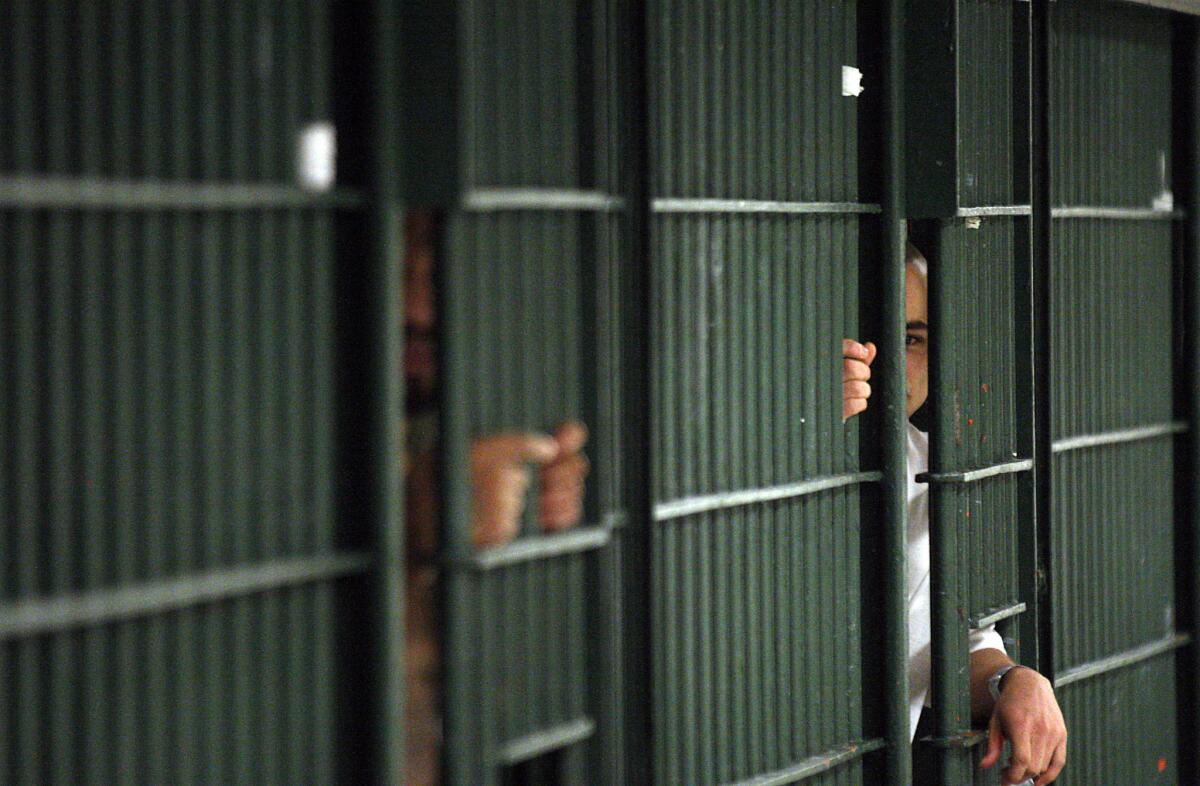Federal trial begins for deputy accused in L.A. County jail abuse case

- Share via
Trial began Tuesday in the first of several criminal cases to arise out of the federal government’s probe into misconduct by sheriff’s deputies in Los Angeles County jails, with prosecutors accusing a deputy of conspiring with several of his superiors to impede the federal investigation.
Deputy James Sexton, who was just three years out of the academy at the time, stands accused of conspiracy and obstruction of justice along with six other defendants for allegedly scheming to keep an FBI informant hidden away from federal investigators. The informant, inmate Anthony Brown, was working with FBI investigators exploring allegations of excessive force and corruption by deputies at the jail.
What Sexton did in the late summer months of 2011 isn’t disputed — he himself talked to federal agents and testified before a grand jury about steps he and others took to move Brown around in the jails under different aliases after deputies realized Brown was working with the FBI.
At issue in the trial will instead be whether his conduct was part of a conspiracy to “get the FBI to back off” from investigating the jails — as a federal prosecutor told jurors Tuesday — or whether he was simply following orders from above designed to keep Brown safe, as Sexton’s attorney argued.
Sexton’s six co-defendants — including two lieutenants and two sergeants — are slated to stand trial immediately after Sexton’s trial is completed. Attorneys for most of the defendants have indicated in court filings that they intend to argue that their clients were following orders from their superiors.
Prosecutors told jurors Tuesday that the conspiracy surrounding Brown began not long after FBI agents arranged a sting operation to bribe a jail deputy to smuggle in a cellphone to Brown.
After the phone was discovered during a routine search, sheriff’s officials did not initially place a big priority on investigating the smuggled phone, which would be a misdemeanor charge for the inmate, they said.
Once deputies discovered that Brown had been communicating with the FBI’s civil rights division, the tenor of the sheriff’s internal investigations changed, Assistant U.S. Atty. Lizabeth Rhodes told jurors.
“They decided, in James Sexton’s own words, ‘It was time to break out the smoke and mirrors,’” she said.
Because Sexton was adept at navigating the computer system logging inmates, he was asked by Lt. Gregory Thompson, who is also charged in the case, for his opinion on how to move Brown around within the jail, Rhodes alleged.
Brown, who was serving several life sentences, was suddenly marked as “released” in the system.
He was instead booked under a series of different names — John Rodriguez, Kevin King and Chris Johnson — with different heights, weights and without fingerprints or Social Security numbers, all designed to keep him away from his FBI handlers, Rhodes said.
“It was defendant Sexton who knew how,” she said. “He was just gone.”
Sexton’s attorney told jurors instead that his client was a “very junior deputy” who was but a pawn following orders in a “very public and nasty jurisdictional battle.”
The FBI’s planting of a cellphone with an inmate with a violent record, with 15 felonies including armed robbery and assault with a deadly weapon, was a “well-intentioned but poorly planned and extremely dangerous” operation, said Sexton’s attorney, Thomas O’Brien.
O’Brien noted the Sheriff’s Department has as much authority to investigate actions within its jails as the FBI does, and said deputies were doing their own legitimate investigation into the smuggled cellphone rather than obstructing the federal probe.
In fact, moving Brown around in the jails, O’Brien contended, resulted from a phone call from Steve Martinez, then-chief of the FBI’s L.A. field office, to Sheriff Lee Baca. Martinez asked Baca that Brown be placed in a protective unit for his own safety, O’Brien told jurors.
Sexton and his colleagues were attempting to keep Brown safe from corrupt deputies he was informing on, the attorney said.
Showing jurors a chart of the department’s command structure, O’Brien pointed out how low Sexton was on the hierarchy.
“The only crime James Sexton committed was doing his job as he was ordered to do,” he said.
More to Read
Sign up for Essential California
The most important California stories and recommendations in your inbox every morning.
You may occasionally receive promotional content from the Los Angeles Times.











